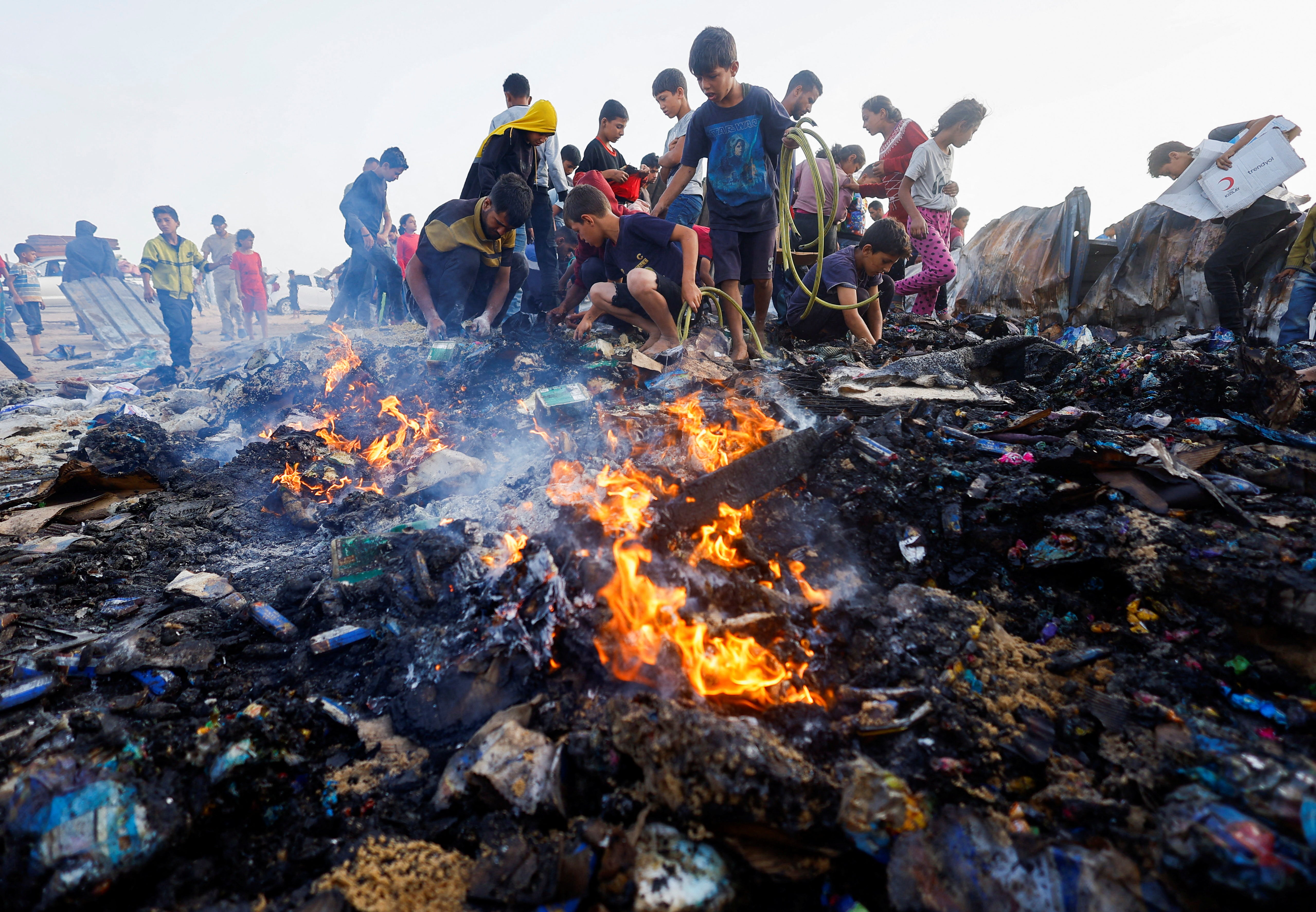Smoke rises following Israeli strikes on Rafah (Photos by Reuters)
It comes as Israel faces international outcry over strikes on city – with more than one million people having fled in the last three weeks
Reposted from the Independent
Israeli tanks have pushed into the centre of Rafah for the first time, as Israeli forces bombard the Gaza border city where hundreds of thousands of people are sheltering.
It came as the UK called for “swift and transparent” full investigation into an airstrike and subsequent blaze that killed at least 45 people in a tent camp in the city on Sunday. The strike on the Tel al-Sultan neighbourhood, which the Palestinian Red Crescent said is partially located in a designated humanitarian zone, has led to an international outcry. More than half of the dead are said to be women, children and the elderly.
Palestinian officials claimed on Tuesday that at least another 21 people were killed in tank shelling that hit another tent camp in al-Mawasi in western Rafah. However, the Israeli military denied this. “Contrary to the reports from the last few hours, the IDF did not strike in the Humanitarian Area in al-Mawasi,” a statement said.
In an earlier statement, the Israeli army said that an initial investigation by their own forces into the strike on Sunday found that the blaze near the tent camp was caused by a secondary explosion. Chief military spokesperson Rear Admiral Daniel Hagari said it was still unclear what set off the blaze, but that the military fired two 17kg munitions targeting two senior Hamas militants. He said the munitions would have been too small to ignite a fire on their own and the military is looking into the possibility that weapons were stored in the area. The fire could have ignited fuel, cooking gas canisters or other materials in the densely populated camp, where people were sheltering under little more than tarpaulin and cloth.
Britain’s foreign secretary, David Cameron, described the scenes from the strike as “deeply depressing” and urged Israeli military to conduct a “swift, comprehensive, and transparent” probe.

A Downing Street spokesperson said Britain would not support a major military operation in Rafah without a plan to protect the hundreds of thousands of civilians who remain there.
Mr Netanyahu has called the deadly strike on Sunday a “tragic mishap”.
Meanwhile, Israeli tanks pressed ahead with their offensive into Rafah. Tanks and armoured vehicles mounted with machine guns were spotted near al-Awda mosque, a central Rafah landmark, witnesses told Reuters.
Since May, Israel has mounted a ferocious ground assault into Rafah causing nearly a million people, most of them displaced multiple times, to flee.
They are now seeking refuge in squalid tent camps with dwindling water, food and medical supplies in other war-ravaged strip. In places such as Khan Younis, which is further north and largely destroyed, civilians said they were struggling to find water.
The United States, the UK and other allies of Israel have warned against a full-fledged offensive in the city, with the Biden administration saying that would cross “a red line” and refusing to provide offensive arms for such an undertaking.
The International Court of Justice has called on Israel to halt its Rafah offensive and reiterated its demand for the immediate and unconditional release of hostages held in Gaza by Hamas. Israel has continued its Rafah operation, saying the court ruling grants it some scope for the action.

Israel launched its most ferocious bombardment of Gaza ever in retaliation for the 7 October attack by Hamas on southern Israel, during which they killed around 1,200 people and took over 250 hostage.
Since then, Palestinian officials say Israel’s bombing has killed more than 36,000 people, the majority women and children. The focus has, in recent months, been Rafah.
Palestinian health ministry officials told The Independent the city was being pounded with ferocious air strikes and tank fire, and that new strikes in the Tel al-Sultan district – the district where Sunday’s strike hit – killed at least 16 Palestinians.
The Israeli military said its forces continued to operate in the Rafah area, without commenting on reported advances into the city centre.
There are also concerns about the health system. Most of Gaza’s hospitals are no longer functioning. Medics at the Kuwait Hospital in Rafah told The Independent it shut down on Monday after a strike near its entrance killed two health workers.
Palestinian health ministry officials in Gaza said two medical facilities in Tel al-Sultan are out of service because of intense bombing nearby.
A spokesperson for the World Health Organization said casualties from Sunday’s strike and fire “absolutely overwhelmed” field hospitals in the area, which were already running short on supplies to treat severe burns.
Moamen, 27, who is displaced from the very north of Gaza and was in the camp that was targeted on Sunday, said most of those in the area had been told it was in the humanitarian zone and they had no money to go anywhere else.
“I heard three missiles and a huge, very powerful explosion that shook the place. It appears that the rockets used were incendiary, as fires broke out in the area,” he said.
Bel Trew is The Independent’s award-winning Chief International Correspondent, photographer and documentary filmmaker currently based in Berlin. Bel has covered events across the Middle East since the start of the Arab Spring in 2011, reporting on uprisings and wars from South Sudan to Yemen, Iraq to Syria. With a background in both the Gulf and Eastern Europe, she has since widened her scope to covering news events across the globe, including Ukraine, including the original documentary ‘The Body in the Woods’. Bel was named Foreign Reporter of the Year at the UK Press Awards and also won the Marie Colvin Award. She has lived across the Middle East from Cairo to Beirut.

